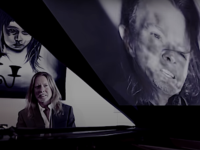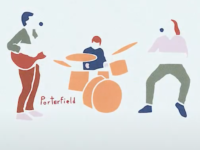Maud, a pseudonym for musician, producer and composer Kristine Hoff, is becoming a staple on the Norwegian festival scene while being recognized in other countries as well.
She studied at Kristiansand’s University of Agder, and was originally spotted at a show by director Achal Dhillon then added to the roster at Killing Moon in Norway. This self-titled debut album, which arrives on May 21 after two years of preparation, finds Maud composing from deeply personal experiences. She also produced, arranged and sings on Maud, so every track is deeply associated with her personality and character.
“In many ways this album stands out as a proof that I can be in charge of all the creative processes of making my music,” Maud says. “Gaining the creative control over my own project has been so rewarding, and I can’t wait for this journey to continue.”
Maud is unapologetically written and delivered. Some of the lyrics are forceful, yet there is a touch of vulnerability which also comes across to the listener – and this makes it engaging. At the same time, Maud is fiercely determined not to allow gender to define her music: “I think women in music are capable of the same things as men,” she adds.
Maud would like to see more females going into music production, and to follow their own path from early on in life. As if to prove this individuality, her debut album is impossible to categorize, and the lyrics could apply to anyone.
“Prologue” opens Maud, and is a guttural, immense sound of deep, rich textures overlaid with sweet vocals. Lasting just under a minute and a half, it serves as a great introduction for the rest of the album. “Baby Girl” is a powerful, no-nonsense song about being strong, fighting for what is right and being alone – one woman advising another on the vagaries of being female and having to be strong. The arrangement and instrumentation is heavily textured and punctuated with strong vocal cries, but there is also a delicacy.
“Real” is about the mind and how dreams and thoughts affect us. The song is dotted with the f-word but Maud uses it as a punctuation more than anything else, its effectiveness lost due to repetition. The result is an inward-looking song with a sense of losing control, and a desire to take it back. It is also about relating to one other person in a special and close way. “Nobody” is about finding how to love yourself – with the help of a therapist or not – and there is a delicious sense of the slightly insane with the altered voice additions, timed beautifully with the sighing lead vocals.
“Future” is packed with rhythmic changes and tells of love and growing. “I believe the track speaks for itself, and it can be interpreted in many ways,” Maud says. “However, I hope ‘Future’ can resonate with the feeling many of us have right now in the midst of a pandemic, at a time when we don’t know yet what we’re going to face in the future.
“I think I’ve always been scared of the unknown, and I tend to worry a lot about the future,” Maud adds. “‘Future’ explores these emotions while also embracing the fact that it’s impossible to look into the future, because life is so unpredictable. Writing this song was a way of coming to terms with my future anxiety, knowing it would only be possible to evolve if I could just lean back and enjoy the ride.”
“Stay Back” is about people being here for different reasons, being on different pages and also the fact that we can do things ourselves and do not need teaching, direction or others. There is a sense of strong individuality as Maud duets with herself and argues for succeeding alone. “Up to Me Now” is powerful and driving, with some beautifully worked harmonics. It is about finding strength and hope in your own self.
“Bad Things” is dark, menacing and a contrast to the hopefulness of the previous track. Maud sings of the changes she has felt, losing her way and longing to feel better so she can enjoy doing bad things again. There is a two-note deep motif which is worked through the track, emphasizing that menace. This was the single first released from the album and it got her on the cover of Deezer’s New Electronic playlist. Radio plays followed on many stations.
“Alone Together” is lighter, sweet almost and romantic. It tells the story of love, loss and sadness. There is intensity and a deep sense of hopeless longing. “Aftermath” finishes Maud and is filled with musical nuances, changes of tone and a sense that everything in the album which has gone before is gathered in snippets here.
Maud’s vocals have a laid back, easy tone and she performs brilliantly on some of the quieter passages. The album is intriguing, and she has an individual and self-assured delivery which is positive and uplifting. Maud is keen to speak to and encourage female producers and musicians, but this album could be inspirational to any gender.
- Milena Casado – ‘Reflection of Another Self’ (2025) - May 4, 2025
- Luis Ianes and Noel Akchote – ‘Seuil’ (2025) - April 12, 2025
- David Dower Trio – ‘Sonder’ (2025) - March 23, 2025




